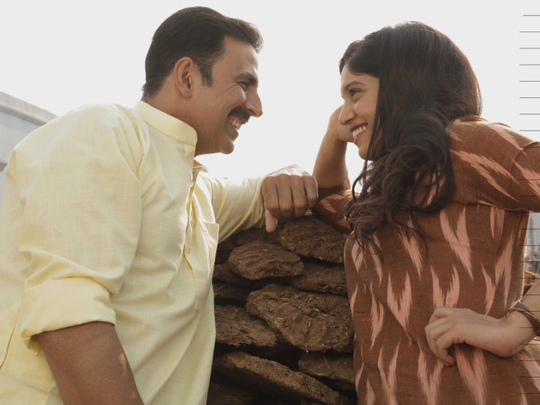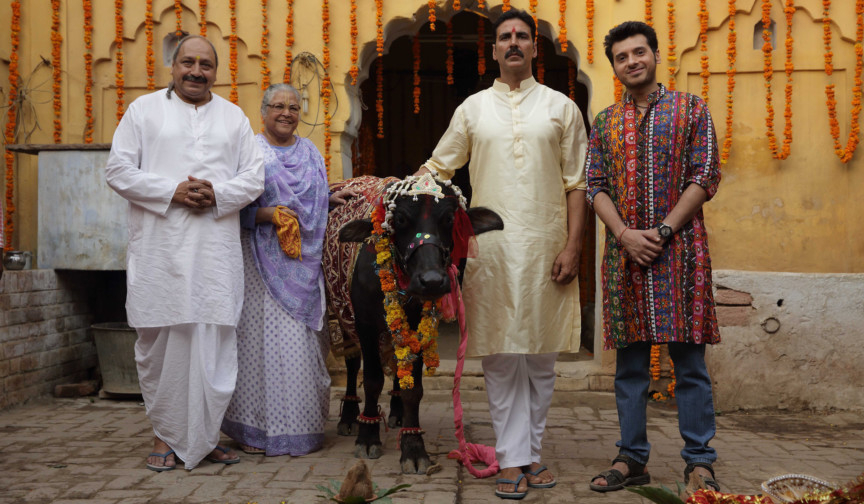
Indian National Award-winning actor Akshay Kumar has taken one for the women’s team in his latest satire, Toilet: Ek Prem Katha, out in UAE cinemas this Thursday.
His character, Keshav, spearheads a love story that turns sour when his new wife, played by Bhumi Pednekar, learns that there’s no proper sanitation in her husband’s home.
Keshav didn’t think much of the issue until his wife expressed her mortification over having to do her business in the open fields. Then, the dutiful husband tries to save their relationship by building her a toilet at home amidst resistance from his family and village elders.
As far as romantic gestures go, it’s an unusually grand one.
In this romance, directed by Shree Narayan Singh, the protagonists’ rift goes beyond the usual relationship problems such as forgetting your partner’s birthday or ordering the wrong take-out. It’s an important topic that’s been handled with a deft hand, Kumar claims.
“I was aware our country had issues about sanitisation, but Toilet: Ek Prem Katha has been the biggest eye-opener for me as the issues of open defecation taught me that this wasn’t solely an issue about keeping India clean, but an issue affecting so many people in such distinct ways. It impacts women’s safety, it challenges their dignity and it disempowers women. Above all, it taught me that before anything can change, you need to change your mind set and that’s a scary thought,” said Kumar in an e-mail interview.
Many homes in India resist the idea of building toilets indoors as they believe that defecating where they pray or cook is unholy.
Toilet: EK Prem Katha is set in Uttar Pradesh, a land of the sacred rivers in India.
“Fields are for crops. If [a] certain section of the society say it’s revolting to have a toilet in a home where food is cooked, they need to be made aware that defecating in fields where food is grown is far more unethical. This is where I trust in the youth of today to take the old ways and turn them into a new, improved way of living, in the most respectable and influential manner possible. Your mind, views, beliefs and values can be your biggest weapons and strength all at the same time,” he added.
Written by Siddharth Singh and Garima Wahal, Toilet: Ek Prem Katha stoked the activist in Kumar, who has been raising a stink about the lack of toilets during the film’s promotions. Here the actor, who believes in the Gandhian principle of being the change that you want to see, speaks about his film being reduced to a political mouthpiece (a charge he denied), using cinema to showcase a burning social issue and why he chose to invest in an unconventional romance.
What should we know about Toilet: Ek Prem Katha and what about the subject drew you to its lead role?
Toilet: Ek Prem Katha is a quintessential love story where you could say the villain in the film is — believe it or not — a toilet. However, as the film progresses, you’ll see the humble toilet ends up a being a tool for change and ultimately the hero of the film as it brings Keshav (played by me) and Jaya (played by Bhumi) together forever. What got me hooked was the genuine love story. Whatever reservations I might have had were outweighed by the chance of making this film into a reality so that the world could witness that India may have 3D movies, but not toilets. I wanted this subject to be heard by creating a dialogue about a serious issue by using humour as its backdrop and drama as its driving force. I’ve never believed that preaching to an audience will inspire them to create change. Messages need to be told in creative, subliminal ways and you need to give citizens a meaningful reason for them to want to change. What better medium than cinema to throw spotlight on issues?
Did you fear that this film will become a mouth piece for the existing Narendra Modi government and its Swachh Bharat Abhiyan [Clean India Movement]?
The film certainly puts the spotlight on the Swachh Bharat movement, which I feel has been an incredible initiative by the government. But at the same time, I wouldn’t say this film is a political mouthpiece. Prime Minister Narendra Modi and his team are running a great campaign to help solve this issue, and if Toilet: Ek Prem Katha can help raise awareness and maximise the campaign’s potential then that’s brilliant. The government has their own methods in that regard, but we have to remember that while this film carries an important message, it also carries huge entertainment value.
The subject of sanitisation can easily go down the crass toilet-humour route. How did you ensure that the film isn’t distasteful?
Like I always say, no actor or director can predict an audiences’ reaction. This is such a strange yet brilliant subject to be brought to the big screen. It may be offbeat, but it’s worth every rupee.
Toilet: Ek Prem Katha by the use of satire, humour, songs, dance and drama puts [the] focus on open defecation and the impact it has across society, especially for women’s safety, and is a responsible film. Let’s keep the positivity going and spread this film’s great message. I’m dying to see the change this film could bring, if given the chance.
The film’s trailer was loved for its realistic representation of love and the problems that arise between couples in a rural set up. Did you meet couples or women like Priyanka Bharti (who fled her husband’s home after realising that there were no toilets there)?
There wasn’t any preparation as such as this is a quintessential love story and anyone who has been in love or had to fight to keep their love, can relate to the subject of the film. But I did meet several women and men who don’t have access to a toilet to gain insight. Hearing their comments and learning about their issues was an eye-opener and it touched my soul. I was inspired to make a change.
What do you want the audience to take away from this film?
Firstly, I want the audience to enjoy the film and be entertained but at the same time, I wish they would understand that there’s a need for us as a society to join forces in order to address issues. It won’t happen overnight but with awareness and courage we can be the change we wish to be and see in the world. For me, change and awareness can start with cinema and I hope films such as Toilet have a positive effect on everyone and create a change not just physically but socially as well.
This film has the danger of becoming didactic. So were you fearful about it becoming a moral and social commentary that’s preachy?
This is completely the opposite of what I wanted Toilet to be. As a viewer, I don’t find issue-based documentaries engaging at all. I switch off. And the last thing anyone wants is to be preached at. We have an excellent team on board for the film who are committed to making good, entertaining cinema.
What was the brief given by the director, Singh, to play your part?
In Toilet: Ek Prem Katha, my character is an honest and an extremely gullible man who decides to embrace change from the depths of Uttar Pradesh. My character doesn’t know the facts of life until my beloved lady marries me and I realise just how much is wrong in my society, in my own house and how elders can brainwash us into obedient silence if we’re not careful. So I had to take this brief on board and simply act.
Will the film make us re-consider our own problems that are decidedly first-world and trivial when compared to the lack of sanitisation in India?
I hope so. But I think we also need to remember the open defecation crisis is not just a problem in villages but also in urban areas. This is misconception a lot of people have, so knowing how close to home the issue is, I hope people are encouraged to act and do something about this.
Did you slash your fee to make this project more commercially viable?
Firstly, this project has to be commercial in order to create the mass awareness we’re aiming to build up. I have produced this film and have put my name to a project which many actors in the industry didn’t want to attach themselves to. I hope this will give them the confidence that I am genuinely interested in subjects that we’re covering in Toilet: Ek Prem Katha and that I’m also willing to put my neck on the line in order to do something I want to in life, to stand up for it, or bring awareness to those that might not be aware or even care for it.
I knew what I was getting myself into and I knew about the commercial risks, the money involved, the image I could damage if my efforts go unaccepted, but I also know that I’d never forgive myself if I didn’t try or if I let fear of failure rule my ‘want’ to do better. The rest is down to the public.
___
Don’t miss it!
Toilet: Ek Prem Katha releases in the UAE on August 10.













